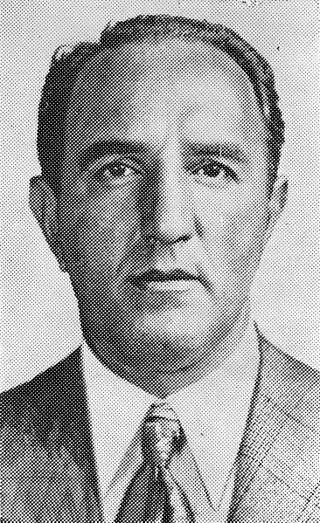Top Qs
Timeline
Chat
Perspective
Vincent Alo
American mobster (1904–2001) From Wikipedia, the free encyclopedia
Remove ads
Vincent "Jimmy Blue Eyes" Alo (May 26, 1904 – March 9, 2001) was a New York mobster and a high-ranking capo in the Genovese crime family who set up casino operations with mob associate Meyer Lansky in Florida and Cuba.
This article needs additional citations for verification. (July 2015) |
Remove ads
Early years
Born in Harlem, Alo started working on Wall Street at age 14. As a young man, Alo was convicted of armed robbery and sent to either Sing Sing or Dannemora state prison.[citation needed]
In 1926, Alo became a made man, or full member, of Joseph "Joe the Boss" Masseria's powerful New York gang. Named a caporegime of the old Joe Adonis crew, Alo oversaw clubs, speakeasys, and illegal gambling in Brooklyn.[citation needed]
Remove ads
Partnership with Lansky
Summarize
Perspective
In 1929, Lucky Luciano, one of Masseria's lieutenants, introduced Alo to Meyer Lansky. An old friend of Luciano's, Lansky was a valuable money-maker for Masseria's organization and Luciano wanted Alo to guard him. Luciano may have wanted Alo to also monitor Lansky (a claim reinforced in Vincent Teresa's My Life In the Mafia and The Last Mafioso by Ovid Demaris). However, the majority of crime historians view this as unlikely, as Lansky was at this time the head of a gang independent of Masseria and Luciano called the Bugs and Meyer mob, which made much of their income through extortion and was one of the most violent gangs of the era. Alo is described as a junior partner in Lansky's operations in virtually all sources, if mentioned at all. Both Lansky and Alo were introverted, bookish men who wanted to become legitimate businessmen. The two mobsters quickly became friends.
When Alo first met Lansky, Alo was involved in a setting up a casino in the town of Hallandale, Florida (now called Hallandale Beach). Immediately realizing that Alo would be perfect for this venture, Meyer invited him to become a partner. When Lansky and Alo arrived in Florida, they immediately started making contributions to local fraternal organizations and secret payments to politicians and law enforcement.
When they opened their first casino in Hallandale, Alo and Lansky faced no government or public opposition. Business was so good in the first casino that Alo and Lansky soon opened a second one in Hallandale. This cooperative relationship between the town and the mob would continue uninterrupted until 1947. As the town's economy became more diversified, public embarrassment about the illegal gambling increased. At that point, Alo and Lansky closed their two Hallandale casinos and started planning for casinos in Cuba.
Remove ads
Later years

In 1970, Alo was convicted of obstructing justice. Robert M. Morgenthau, U.S. District Attorney for the Southern District of New York, stated that "Alo is one of the most significant organized crime figures in the United States. He is closely associated with Meyer Lansky of Miami, who is at the apex of organized crime." Alo was described as being charming, intelligent and well liked by his associates. He retired in the mid 1970s and his crew was taken over by Matthew Ianniello.
On March 9, 2001, Alo died of natural causes in Florida at age 96. His remains were interred in Woodlawn Cemetery in the Bronx.
In popular culture
Summarize
Perspective
The character Johnny Ola, portrayed by Dominic Chianese, in the film The Godfather Part II (1974) is based on Alo.[citation needed] The character Victor Tellegio, portrayed by Robert De Niro in the film American Hustle (2013) is based on Alo, as well.[1]
He also provided the full story of Prohibition-era bootlegging to Drew Struzan's wife Dylan, who published it as the 2019 nonfiction narrative book A Bloody Business.[2]
He is mentioned early in the 2019 Martin Scorsese film The Irishman by Frank Sheeran, also played by De Niro.
Alo is a key figure in the 2025 gangster pulp fiction styled novella series, "The Payola Chronicles - How the Mafia & the CIA Created Rock & Roll", by Justin Stamm. It is a fictional series based on real events and characters from the world of the mafia, as sourced from Diana Stamm's conversations and interviews with her real life Godfather, Mafia Boss Vincent "Jimmy Blue Eyes" Alo, as well as many other contributors, as indicated in the Preface and Acknowledgments sections of the book . As a Hollywood producer, her relationship with Alo began in 1989, after being introduced to him by his Associate, Tommy Sobeck, who later became her partner on the project. In 1991, she enlisted her friend, Dylan Struzan, as a writer for hire, to attempt to write the book about his life. Later, Struzan departed from Stamm's employment and produced an unauthorized book on the subject. Struzan was never given the full story of Alo's life. In addition, Diana has retained the sole rights to Jimmy Alo's life story since 1989. "The Payola Chronicles", documents the entire history of Stamm's relationship with the Jimmy Alo story and it's development as a media project. [3][4]
Remove ads
References
External links
Wikiwand - on
Seamless Wikipedia browsing. On steroids.
Remove ads

